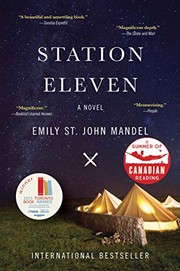ATMmachine reviewed Station Eleven by Emily St. John Mandel
Masterful writing
5 stars
The plot of this book is not only interesting but one that lets you think. The writing is superb and it is an overall beautiful book.

Paperback, 352 pages
English language
Published April 10, 2017 by Harper Perennial.
The international publishing sensation now available in paperback: an audacious, darkly glittering novel about art, fame and ambition, set in the eerie days of civilization’s collapse
One snowy night, a famous Hollywood actor dies onstage during a production of King Lear. Hours later, the world as we know it begins to dissolve. Moving back and forth in time—from the actor’s early days as a film star to fifteen years in the future, when a theatre troupe known as the Travelling Symphony roams the wasteland of what remains—this suspenseful, elegiac, spellbinding novel charts the strange twists of fate that connect five people: the actor, the man who tried to save him, the actor’s first wife, his oldest friend and a young actress with the Travelling Symphony caught in the crosshairs of a dangerous self-proclaimed prophet. Sometimes terrifying, sometimes tender, Station Eleven tells a story about the relationships that sustain us, …
The international publishing sensation now available in paperback: an audacious, darkly glittering novel about art, fame and ambition, set in the eerie days of civilization’s collapse
One snowy night, a famous Hollywood actor dies onstage during a production of King Lear. Hours later, the world as we know it begins to dissolve. Moving back and forth in time—from the actor’s early days as a film star to fifteen years in the future, when a theatre troupe known as the Travelling Symphony roams the wasteland of what remains—this suspenseful, elegiac, spellbinding novel charts the strange twists of fate that connect five people: the actor, the man who tried to save him, the actor’s first wife, his oldest friend and a young actress with the Travelling Symphony caught in the crosshairs of a dangerous self-proclaimed prophet. Sometimes terrifying, sometimes tender, Station Eleven tells a story about the relationships that sustain us, the ephemeral nature of fame and the beauty of the world as we know it.
The plot of this book is not only interesting but one that lets you think. The writing is superb and it is an overall beautiful book.
Listened to this on audiobook, which it was pretty good for. I wasn't expecting much and therefore it met my expectations. I liked the structure of weaving together all the different storylines, it was decently well written. After a while I started getting annoyed at how useless everyone was after their tech stopped functioning, it's not like ALL knowledge disappears and suddenly people are like "huh, wow, I simply cannot fathom HOW airplanes worked?" idk.
Listened to this on audiobook, which it was pretty good for. I wasn't expecting much and therefore it met my expectations. I liked the structure of weaving together all the different storylines, it was decently well written. After a while I started getting annoyed at how useless everyone was after their tech stopped functioning, it's not like ALL knowledge disappears and suddenly people are like "huh, wow, I simply cannot fathom HOW airplanes worked?" idk.